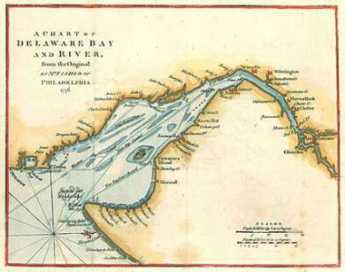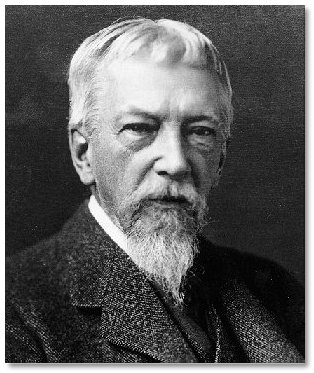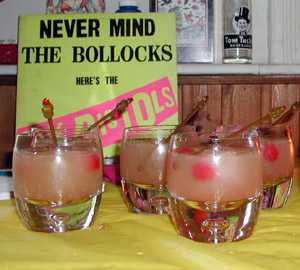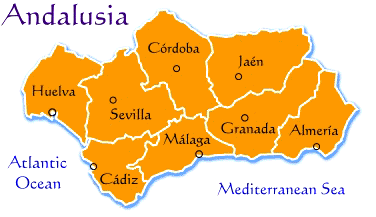Related Topics
Customs, Culture and Traditions
Abundant seafood made it easy to settle here. Agriculture takes longer.
Food and Drink in Philadelphia
A flowing abundance of food sources made Philadelphia the capital of food and drink, right from earliest times.
Philadelphia Drink

|
| Delbay |
Pennsylvania was founded as a religious colony, but it should not be assumed that the early Quakers were all tea totalers. The drinking water was suspect in all parts of the world, especially in the swampy Delaware Bay area. A great many colonial houses had brew-houses nearby and made no bones about it. Prohibition traces its more recent origin to a counter-reaction to the craze for gin which swept the country in the early 19th Century, leading successively to the Salvation Army, which was a Methodist movement, and to the Volstead Act. When all that settled down, Pennsylvania was left with a system of State Stores, a monopoly of packaged liquor by civil servants. As usually happens with such government adventures, the State Store system led to higher prices and less choice, famously poor service, and usually rude salespeople. If you wanted to develop a private wine cellar, you were pretty much out of luck, and it usually was not successful to come home from a foreign trip and ask for something new you had encountered abroad.

|
| Aid |
It thus happens that Philadelphia has only three traditional alcoholic drinks, and all three are sort of fading out. Madeira used to be the big party drink. Probably because of the trade routes, but possibly because of preference for the taste as compared with port and sherry, many parties were held for the sole purpose of opening a new keg of Madeira, and many annual celebrations had Madeira toasts as the official tradition. S. Weir Mitchell enshrined that tradition in a story, "The Madeira Party", and F. William Sunderman, who died at the age of 104 in 2003, wrote a similar ode to the Madeira tradition. Occasionally a hostess will go to the trouble of assembling a modern Madeira party, but it takes some effort to do so. Being quaint is not the same as being traditional.

|
| Fishouse |
The ingredients of Fish House Punch, on the other hand, are not difficult to obtain. A bowl of punch will do away with the need for a bartender and tends to assemble a jolly crowd around a table. The point was recently reaffirmed when the manager of the Union League converted one dining room to a luncheon buffet for regulars at the club tables. The idea was to allow businessmen in a hurry to get started with lunch without the delay of waitress service, but what quickly developed was that the buffet table became a greeting and gathering place, valuable in itself for enhancing the camaraderie of a club.

|
| Andalusia |
The Fish House referred to is now next to Andalusia along Delaware, although originally on the Schuylkill, and is one of those really traditional clubs where the members do the cooking and serving. The origins of many things are symbolized by the Tally Ho bowl of the Fish House, derived from the pre-Revolutionary Gloucester (NJ) Hunt and given by the First City Troop in honor of the joint membership of Captain Morris in both organizations. If you don't happen to have a Tally Ho bowl, any bowl will do.
The Union League has a similar drink, called the Union League Special*, which tastes much like a Whiskey Sour Punch, and is usually stored back of the bar in gallon jugs. Instead of a punch bowl, the Special is usually served in a tall glass. There is a general impression that the Special is stronger than the Fish House, but it is only a matter of personal opinion as to which tastes better.
* UNION LEAGUE APPETIZER ( Individual 6oz. Cocktail)
1 oz. RYE 1/2 oz. MYERS JAMAICAN RUM 1/2 oz. TRIPLE SEC 1 oz. LEMON JUICE 1 oz. ORANGE JUICE 1/2 oz. SUGAR
(Shake Well With Cracked Ice and Strain)
GALLON RECIPE
1 BOT RYE 16 oz. MEYERS JAMAICAN RUM 16 oz. TRIPLE SEC 36 oz. HALF LEMON & HALF WATER 26 oz. ORANGE JUICE 8 oz. SUGAR
(Stir with Block Ice or Cubes Until Cold )
There used to be several fine breweries in Philadelphia but they went away because of globalization, unions, or local taxes, or something, and it is probably true that there is no distinctively Philadelphia beer or wine. At parties, a large number of people are often seen walking around with a glass of clear liquid with some ice cubes in it. An onlooker can't tell, and it is intended that onlookers can't tell, whether the glass contains plain water, or gin, or vodka. None of your business, right?
To return to the point that Quakers have never all felt it is necessary to conform to a sour prohibitionist stance, there is a famous story of the Vaux family, whose country place used to be about where the Chestnut Hill Hospital now stands. Young Richard Vaux was attached to the American legation in London about the time of the inaugural of Queen Victoria and cut a rather fine figure. At the inaugural ball, he gaily danced with the new Queen, and word of it soon reached his mother in America. After summoning the young man to see her, she put down her sewing and came right to the point. "Richard," she said, "I do hope thee will not marry out of a meeting."
Originally published: Monday, June 26, 2006; most-recently modified: Friday, May 31, 2019
| Posted by: Roseanna | Sep 6, 2011 10:17 AM |